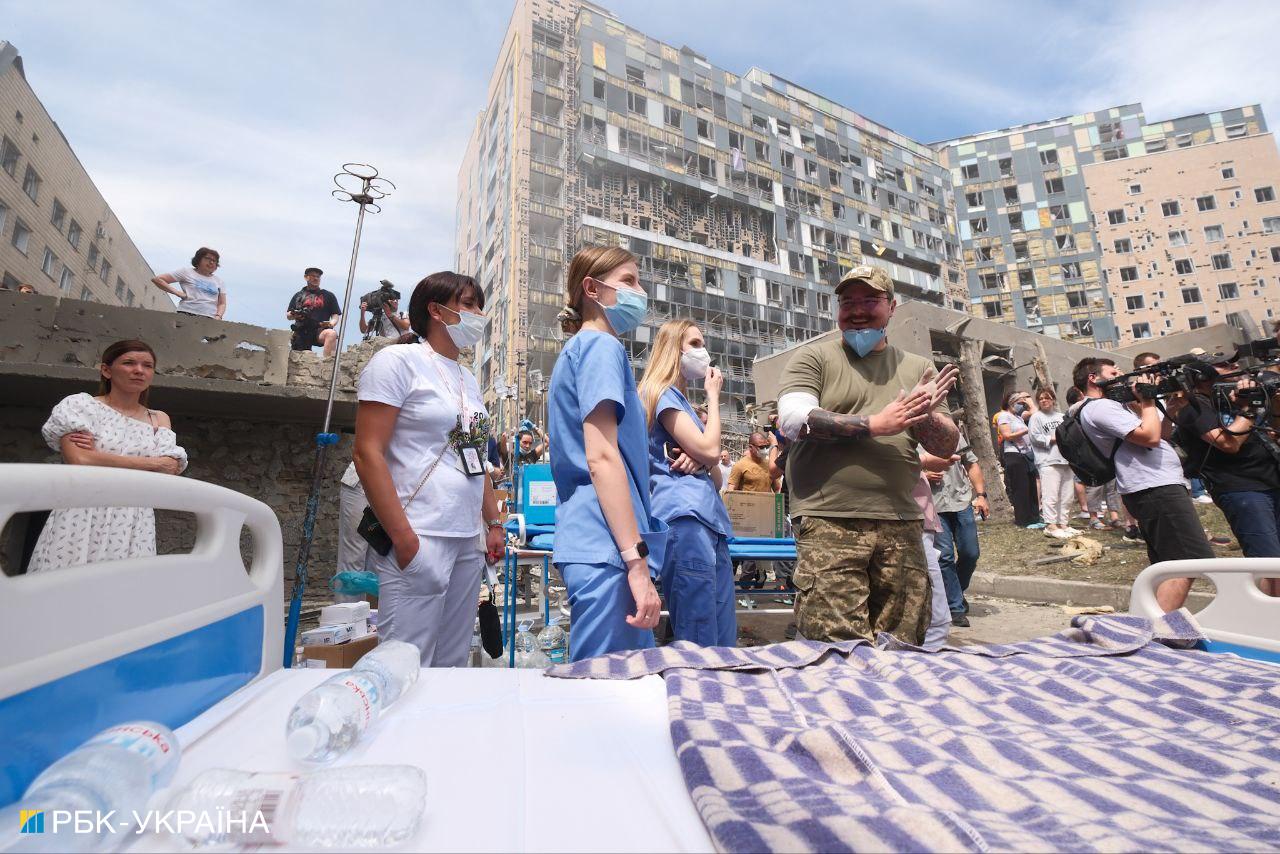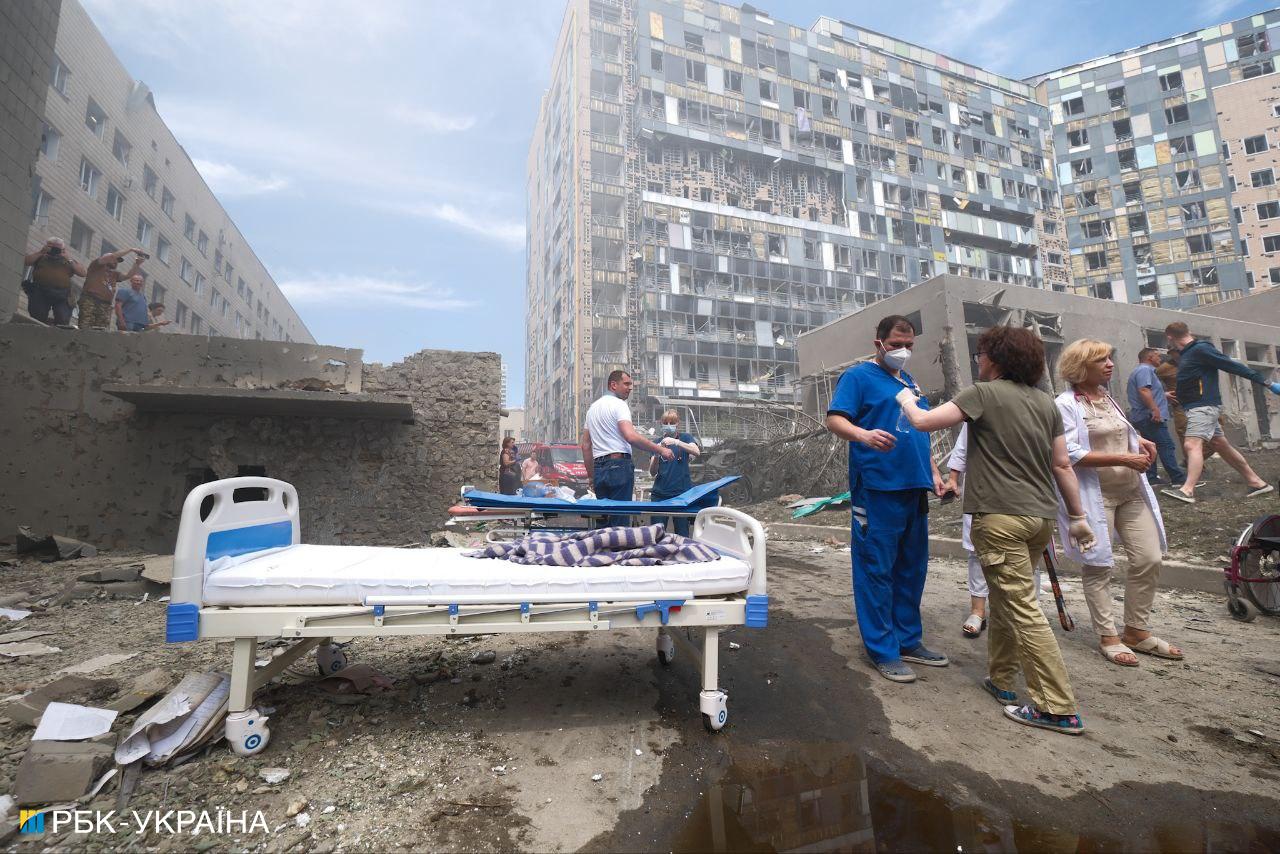Okhmatdyt being dismantled brick by brick for 10 hours now. Report from the site
 Clearing the rubble at Okhmatdyt (photo: Vitalii Nosach/RBC-Ukraine)
Clearing the rubble at Okhmatdyt (photo: Vitalii Nosach/RBC-Ukraine)
On the morning of July 8, Russia struck Ukraine's largest children's hospital, Okhmatdyt, with a Kh-101 missile. The direct hit resulted in the deaths of two people and injured 16 others, including ten children. Rescue workers have been clearing the rubble for almost ten hours.
For details on the aftermath and ongoing rescue efforts, read the report on RBC-Ukraine.
The wailing sirens of ambulances and rescue services do not cease for a moment in the Okhmatdyt area, and the streets are gridlocked. A continuous stream of people flows through the gates leading to the hospital's main entrance. They bring water, respirators, bags, and food. It feels like all of Kyiv has gathered here, which is not surprising given that one of Ukraine's most renowned children's hospitals has been hit by shelling.
A Russian Kh-101 missile struck the hospital directly. By midday on July 8, a video of the missile plummeting and hitting the Okhmatdyt building had spread across all social networks. Russian propaganda, along with the Russian Ministry of Defense, had already issued numerous theories about what happened to the hospital—from claims of Ukrainian air defenses to allegations of a NATO base. However, footage of the Russian cruise missile hitting the building left no room for disinformation.
The Kh-101 hit the hospital's infectious disease wing. At that moment, children with cancer were undergoing dialysis procedures there. Doctors, well-versed in emergency protocols, managed to save the children from the direct hit, but many were still injured. Periodically, patients are carried out through the gates—clinging to the adults carrying them, with bandaged heads and IV needles in their arms.
By midday, the area around the wing is buzzing. People—civilians, military personnel, rescue workers, and doctors—form long lines surrounding the damaged building, clearing the debris. They methodically pass bricks, pieces of concrete, wood, and rebar to one another. Behind them, another line of people holds a water hose above their heads. The air is filled with dust, which settles on hair and clothes within minutes of being there.
.jpg)
The aftermath response at Okhmatdyt has brought together numerous officials including Interior Minister Ihor Klymenko, National Police Chief Ivan Vyhovskyi, and Emergency Service Head Andrii Danyk, who are actively involved in clearing the rubble alongside other rescuers.
"We have about an hour, maybe an hour and twenty minutes, to clear the debris. After that, those who are under the rubble likely won't survive, they'll run out of air," Klymenko says.
The number of volunteers is so large that around the remnants of the building, a large organized crowd has formed, resembling a beehive from the sides. Everyone is engaged. One rescuer approaches Klymenko, informing him that it's possible to inspect the walls inside the building. Amid the stones and remnants of window frames and staircases leading nowhere, the rescuers continuously water chunks of concrete that occasionally catch fire and emit smoke. When the area is sufficiently cleared, the rescuers shout "Corridor!" and heavy machinery moves towards the building.
Just as there's still time to rescue people trapped under the rubble, an alarm sounds. It becomes known that a reconnaissance drone is flying over Kyiv. "They will strike again, it's obvious," people around say. Rescuers and soldiers order all civilians to leave the area and take cover, but many resist, so they push people back and literally herd them into underground passages.
"Please, I beg you, run from here, you know them, they will strike again!" shouts a police officer, urging civilians to move. As one alarm ends, another begins. People sit in underground passages, reading the news to each other—a missile has targeted another hospital. "...They were bringing out a girl, she said, 'I don't want to die,' can you imagine?" one woman says to another, while the other splashes water on her head.

While the alarm continues, a huge crowd has gathered at the entrance. They are dragging packs of water, boxes of respirators, gloves, and bags. At some point, the police guarding to prevent civilians from entering inside rush in shouting, "Man, there's already plenty in there, I'm telling you! We don't need anything else, thank you very much, that's enough!"
The response operation has been going on for more than ten hours. Currently, several ambulances are lined up outside Okhmatdyt. Children are being transported to other medical facilities in Kyiv. "We are sorting the patients now, receiving the most critical children first, and then the less severe cases," says Svitlana, a doctor on duty.
Other regions have also expressed readiness to accept children from the hospital. Oleh Kiper, head of the Odesa Regional Military Administration, announced that regional and city medical facilities have prepared at least 200 beds for children from Okhmatdyt.
Chief of the Rivne Regional Military Administration, Oleksandr Koval, also reported that two hospitals in the region have prepared approximately 100 beds for patients from the bombed hospital. However, this is insufficient. Okhmatdyt is Ukraine's largest children's clinic and one of the largest in Europe, treating around 20,000 children annually. Currently, there's simply nowhere to transfer all patients, so as many as possible have been temporarily discharged.
Svitlana and her child have been sent home. During the Russian missile strike, she was in the hospital. "At that moment, we were in the intensive chemotherapy unit. We had just entered the ward after the procedure when the explosion happened, and seconds later, windows started flying out. The windows in our ward also blew out. Thank God we managed to take cover," Svitlana recounts.
The oncology building, a tall structure with multicolored panels and window frames, was damaged by the impact. Physically, Svitlana and her child were unharmed, but the same cannot be said for their psychological state.

"I could still see the ruined building from the ward. We were right across from the building hit by the shell. I'm still shaking inside. I'm so scared," says Svitlana.
Colleagues Mykyta and Dmytro were among the first responders at the scene. They came to help clear the rubble. A few hours later, covered in dust with masks hanging under their chins, they sit on the curbs outside the hospital.
"I work just across the street. I heard explosions in the morning and went out to see what was happening. Direct hit on the hospital. So there was nothing left to do but go help clear the debris," says Mykyta.
While Okhmatdyt is being dismantled brick by brick, those who are ready to help rebuild it are already appearing in the public space. And the world has yet another confirmation that Ukraine is at war with a terrorist state that is destroying children's hospitals and killing civilians.

